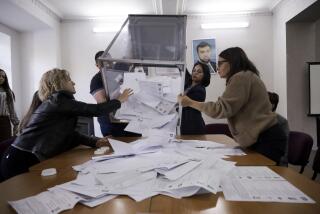Large turnout for election in Iraqi Kurdistan
- Share via
SULAYMANIYA, IRAQ — Long lines snaked out of polling stations Saturday as Iraqi Kurds voted in an election that has stirred fierce passions in this most peaceful corner of Iraq.
The large turnout in the semiautonomous Kurdistan region attests to the enthusiasm generated by the appearance, for the first time, of a viable challenge to the 18-year monopoly of the two ruling parties, the Patriotic Union of Kurdistan and the Kurdish Democratic Party.
Some voters dressed in traditional finery, men in voluminous pants with wide cummerbunds and the women in sequined gowns and headdresses, for an occasion that promises to herald a new era of competitive politics in Kurdistan.
Many in Sulaymaniya said they were voting for the list of candidates fielded by Change, a new movement formed by disgruntled former PUK officials that has garnered a large following among Kurds frustrated by what they see as endemic corruption and nepotism in the region.
“We need change because there is corruption in the current government and there is cronyism,” Alan Shukr, 24, a cellphone salesman, said as he emerged from a polling station with his index finger stained with purple ink, a method of preventing people from voting twice.
It was hard to find voters who had cast ballots for the incumbents, running jointly as the Kurdistani List. The few who did said they had favored the ruling coalition because they wanted to see a continuation of the policies that have made Kurdistan the safest and most prosperous region in Iraq.
No one seriously expects Change to win the legislative vote. The ruling coalition can count on its network of political patronage and control of state institutions to guarantee support, especially in rural areas, and Change’s reach does not extend far beyond its home turf of Sulaymaniya province.
One voter, a driver at the Ministry of Industry, said his manager had warned employees in his department that they would be fired if they did not vote for the Kurdistani List.
Tariq Ahmed, 52, said he nonetheless voted for Change. “If they can see how we vote, then I think they will be firing all the employees,” he said.
It will be enough for Change and other opposition parties to win about 20% of the seats in the 111-seat legislature to make a dramatic difference to Kurdish politics, by bringing opposition voices into the parliament for the first time, independent newspaper publisher Asos Hardi said.
“You can’t have accountability in government without opposition,” he said.
Buoyed by the exuberant showing of its supporters on the streets of Sulaymaniya during the spirited campaign, Change has boldly predicted that opposition candidates will win a majority, if the vote isn’t rigged.
There were widespread reports during the campaign that the Kurdistani List had been distributing cash, guns and cars in an effort to influence voters, said Aram Jamal, head of the Kurdish Institute for Elections, an independent monitoring and voter-education group.
But with Iraq’s Independent High Electoral Commission organizing the poll, and more than 1,000 international and independent monitors observing it, the chances of large-scale election fraud are low, he said.
Iraqi President Jalal Talabani, who is also the leader of the PUK, was among the first to cast his ballot at a polling station in Sulaymaniya. He told reporters that the competitiveness marked “a step forward for a bigger democracy in Iraq and the region.”
Kurdish President Massoud Barzani touched on an issue dear to all Kurds when he cast his ballot in his mountain stronghold of Salahuddin. “I will never compromise on Kirkuk,” he said.
The status of the oil-rich northern city of Kirkuk, which the Kurds regard as their capital, is at the heart of heightened tensions between Kurdistan and the central government in Baghdad that U.S. officials have said pose the most serious threat to the stability of Iraq.
The election campaign focused mostly on domestic issues, and is not expected to herald a change in the region’s long-standing demand for a swath of bordering territory, including Kirkuk, to be incorporated into Kurdistan. All the candidates sought to portray themselves as fierce defenders of Kurdish claims to those territories.
But now that the election is over, some of the fiery rhetoric may subside, making possible a greater effort toward serious negotiations with Baghdad.
--
More to Read
Sign up for Essential California
The most important California stories and recommendations in your inbox every morning.
You may occasionally receive promotional content from the Los Angeles Times.










